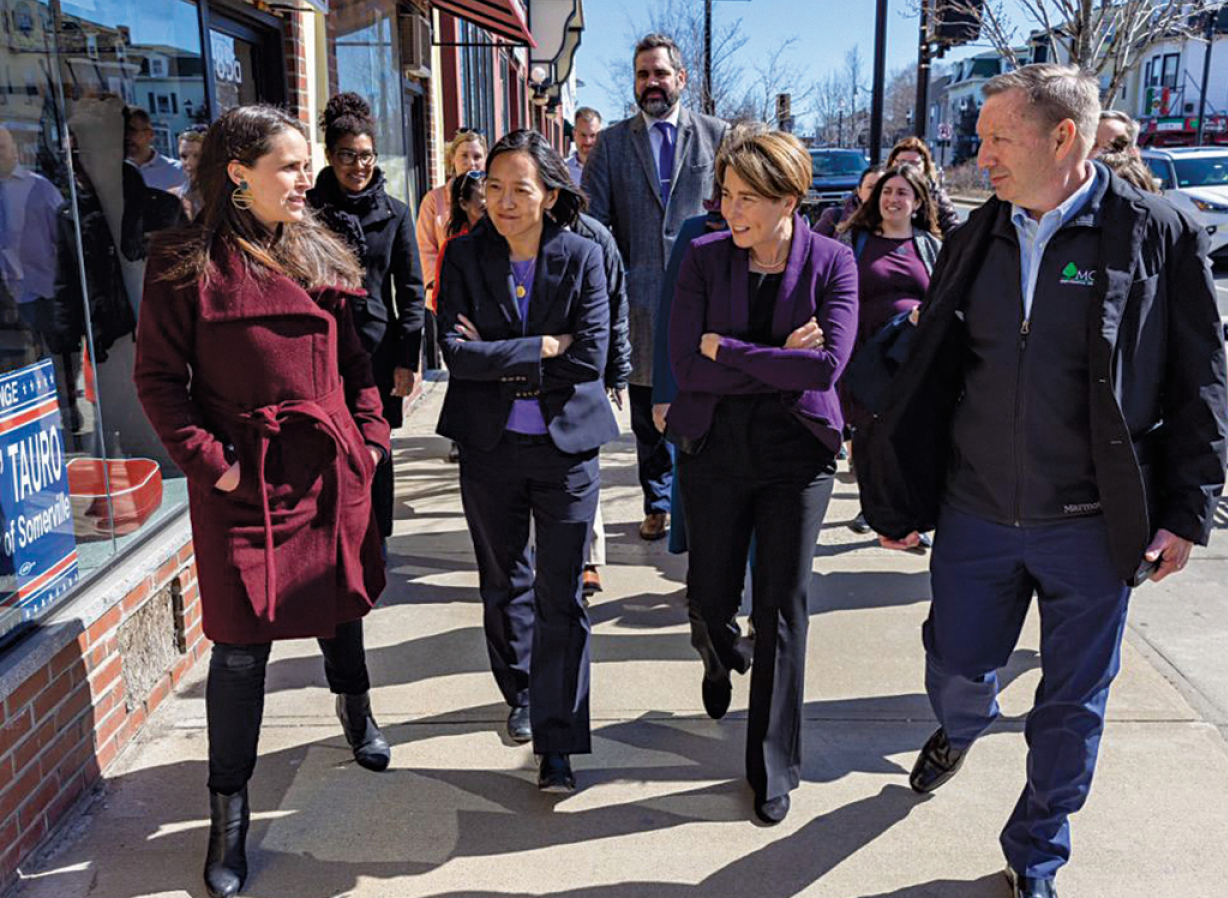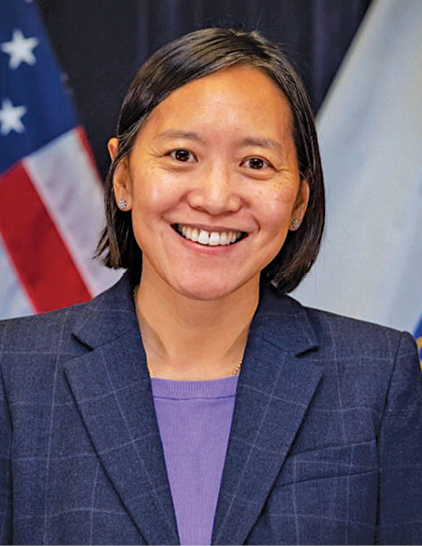When Gov. Maura Healey appointed Yvonne Hao to be the new Secretary of the Executive Office of Economic Development for Massachusetts in January, the administration added someone who knows all about building business.
Hao brings more than 25 years of executive business experience to the job. She has served as a senior corporate executive at such firms as Cove Hill Partners, Pillar Ventures, PillPack and Bain Capital. She has also served on the boards of companies such as CarGurus, Flywire, Gentherm, ZipRecruiter and Bose. From launching companies to funding them, Hao knows business.
That’s why we turned to her for further insight into how Massachusetts plans to foster and enhance economic development statewide.
What policy changes has Massachusetts made in the last few years to make the state a more competitive business destination?
HAO: We’re fortunate to have a strong economic foundation here in Massachusetts to build upon — a wealth of institutions in health care, higher ed, and life sciences; a diverse talent pool and workforce; an enviable tech and innovation legacy. A lot of great work has been done to get us to this point. The creation of the Community One Stop for Growth, which is a single application through which cities and towns can apply for several different economic development and housing grant programs, has made it easier for communities to be considered for several different state resources simultaneously and has made the state an active partner in communities’ economic development investments. And our work to support the life sciences sector through the Massachusetts Life Sciences Center, including through grants, capital projects and tax incentives, has helped make our state a global industry leader.
“I don’t come from government. My background is in the business world, and I think that allows me to bring a unique perspective to this role.”
— Yvonne Hao, Secretary of the Executive Office of Economic Development
Over the next few months, we’re going to be out in all the regions of the state meeting with members of the business community to ask them about the barriers they’re facing, areas where they’re growing, and where they need to grow. I know we have a lot of big challenges and questions before us. But I’m excited to dive in and get to work helping our businesses, communities and people thrive.
Why does Massachusetts annually rank as the No. 1 state in the nation for venture capital per capita?
HAO: Massachusetts has so many strong assets to build on. We have a highly educated and skilled workforce and some of the best colleges and universities on the planet — when you connect that with our life sciences industry, which has matured into a global leader, and our financial strength across asset classes, Massachusetts consistently stands out as a desirable place to invest. My office is going to be really focused on lengthening our lead on this, so that we continue to be among the top states for venture capital investment in the years to come.

Governor Maura Healey is accompanied by Secretary Yvonne Hao on a business tour.
Photos courtesy of Massachusetts Executive Office of Economic Development
What is happening on the housing front to address the need for more affordable workforce housing statewide?
HAO: When I’m having conversations with leaders from companies of every size and scale about how Massachusetts can stay competitive, the housing crisis is always going to be a factor. That’s why Governor Healey and Lieutenant Governor Driscoll made it a top priority to have a dedicated housing expert in their cabinet — they are really showing their commitment to solving this issue. I’m looking forward to having an experienced new colleague to work with in the housing secretary.
“I have a high sense of urgency to make sure that as a state, we’re doing the right things now to ensure that in five or 10 years, we still have a healthy, vibrant economy that benefits everyone.”
— Yvonne Hao, Secretary of the Executive Office of Economic Development
How important is foreign direct investment to your state? What is your state doing to facilitate more FDI?
HAO: My office is really focused on attracting new businesses to Massachusetts and supporting existing ones to stay and expand. That’s going to be vital to maintaining a strong economy in our state. Fortunately, we have a lot of different resources for companies looking to locate in Massachusetts. Our Office of Business Development helps businesses relocating to Massachusetts, and we work closely with MassEcon and MassDevelopment, two economic development partners here, to help businesses identify sites, get sites ready for development, and connect these companies to resources and incentive programs.
You have been described as a leader who “just gets stuff done.” What do you think that means?
HAO: I don’t come from government. My background is in the business world, and I think that allows me to bring a unique perspective to this role. I have experience working with businesses of all sizes and maturities — from startups to large institutions. It’s always about the team, and building strong partnerships with public, private, nonprofit organizations. We have to be one unit — Team Massachusetts — to win on behalf of our state.
You went to Williams and have a home in Western Mass. Do you see that region of the state becoming a more potent economic force?
HAO: Absolutely. When I think about what a healthy economy looks like in Massachusetts, it means the whole state needs to be healthy — every region, community, and sector. That means we need all kinds of businesses and workers to thrive across every region, including Western Mass. Fortunately we have strong partners in that part of the state that are driving innovation and economic growth, such as the Berkshire Innovation Center, the UMass Institute for Applied Life Sciences, and Lever. We have a strong creative corridor in the region thanks to MASS MoCA, Tanglewood, The Clark, and Jacob’s Pillow. And we have great educational institutions in The Five Colleges, Williams, and the Massachusetts College of Liberal Arts. We have a lot of the right ingredients in Western Mass, now it’s just about connecting the dots to help the region become an economic powerhouse.
Business groups say they are worried about the millionaire’s tax having a chilling effect. What is your response
to that?
HAO: I’d say the administration is really focused on attracting and retaining people and businesses in Massachusetts. The governor has proposed tax relief measures that center on affordability, competitiveness and equity, and adjustments to our current tax code that will put us in line with other states. Massachusetts is still a desirable place to do business and we’re going to use every lever at our disposal to protect our leadership position.
What are your most ambitious goals for Massachusetts during your time
in office?
HAO: I have a high sense of urgency to make sure that as a state, we’re doing the right things now to ensure that in five or 10 years, we still have a healthy, vibrant economy that benefits everyone. I want to lengthen our lead and protect the leadership we’ve worked so hard to attain. I’m excited to go after new opportunities on behalf of the state, like federal grant and funding opportunities, where we have a right to win and that will allow us to invest in key sectors, boost workforce development and training opportunities, and offer new forms of support for businesses and startups. I’m really committed to making sure all boats rise with the tide, so that all of our regions have thriving, healthy economies.

